

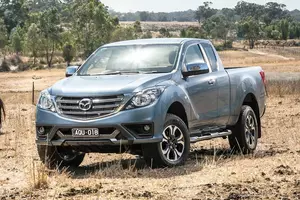
2018 BT-50 Freestyle Cab II (facelift 2018)

2018 BT-50 Dual Cab II (facelift 2018)
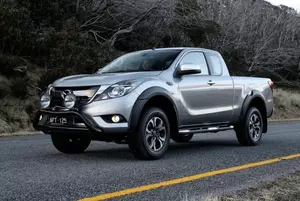
2015 BT-50 Freestyle Cab II (facelift 2015)

2015 BT-50 Dual Cab II (facelift 2015)
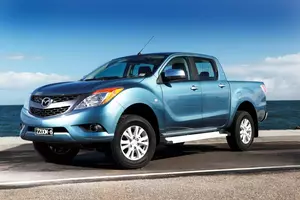
2012 BT-50 Freestyle Cab II

2012 BT-50 Dual Cab II
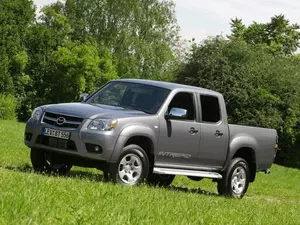
2008 BT-50 Double Cab I (facelift 2008)
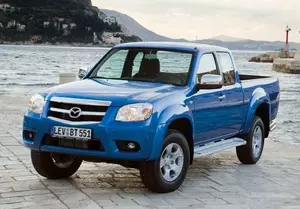
2008 BT-50 Freestyle Cab I (facelift 2008)
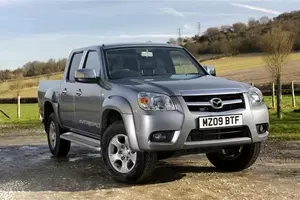
2006 BT-50 Double Cab I

2006 BT-50 Freestyle Cab I

| Vehicle | Curb weight | Difference from world's smallest | Weight to power ratio | 0—60 mph acceleration ratio | Consumption ratio |
|---|---|---|---|---|---|
| XTR 3.2 |
2042 kg / 4503 lbs |
1617 kg (3566 lbs) heavier | 10 kg to 1 hp | - |
211 kg/L (465 lbs/L) |
| Vehicle | XTR 3.2 |
|---|---|
| Curb weight |
2042 kg / 4503 lbs |
| Difference from world's smallest | 1617 kg (1617 lbs) heavier |
| Weight to power ratio | 10 kg to 1 hp |
| 0—60 mph acceleration ratio | - |
| Consumption ratio |
211 kg/L (465 lbs/L) |

| Vehicle | Curb weight | Difference from world's smallest | Weight to power ratio | 0—60 mph acceleration ratio | Consumption ratio |
|---|---|---|---|---|---|
| XTR 3.2 |
2105 kg / 4642 lbs |
1680 kg (3705 lbs) heavier | 11 kg to 1 hp | - |
211 kg/L (465 lbs/L) |
| 3.2 |
2036 kg / 4489 lbs |
1611 kg (3552 lbs) heavier | 10 kg to 1 hp | - |
204 kg/L (450 lbs/L) |
| Vehicle | XTR 3.2 |
|---|---|
| Curb weight |
2105 kg / 4642 lbs |
| Difference from world's smallest | 1680 kg (1680 lbs) heavier |
| Weight to power ratio | 11 kg to 1 hp |
| 0—60 mph acceleration ratio | - |
| Consumption ratio |
211 kg/L (465 lbs/L) |
| Vehicle | 3.2 |
| Curb weight |
2036 kg / 4489 lbs |
| Difference from world's smallest | 1611 kg (1611 lbs) heavier |
| Weight to power ratio | 10 kg to 1 hp |
| 0—60 mph acceleration ratio | - |
| Consumption ratio |
204 kg/L (450 lbs/L) |

| Vehicle | Curb weight | Difference from world's smallest | Weight to power ratio | 0—60 mph acceleration ratio | Consumption ratio |
|---|---|---|---|---|---|
| XTR 3.2 |
2056 kg / 4533 lbs |
1631 kg (3596 lbs) heavier | 10 kg to 1 hp | - |
223 kg/L (492 lbs/L) |
| Vehicle | XTR 3.2 |
|---|---|
| Curb weight |
2056 kg / 4533 lbs |
| Difference from world's smallest | 1631 kg (1631 lbs) heavier |
| Weight to power ratio | 10 kg to 1 hp |
| 0—60 mph acceleration ratio | - |
| Consumption ratio |
223 kg/L (492 lbs/L) |

| Vehicle | Curb weight | Difference from world's smallest | Weight to power ratio | 0—60 mph acceleration ratio | Consumption ratio |
|---|---|---|---|---|---|
| 3.2 |
2036 kg / 4489 lbs |
1611 kg (3552 lbs) heavier | 10 kg to 1 hp | - |
221 kg/L (487 lbs/L) |
| XTR 3.2 |
2105 kg / 4642 lbs |
1680 kg (3705 lbs) heavier | 11 kg to 1 hp | - |
229 kg/L (505 lbs/L) |
| Vehicle | 3.2 |
|---|---|
| Curb weight |
2036 kg / 4489 lbs |
| Difference from world's smallest | 1611 kg (1611 lbs) heavier |
| Weight to power ratio | 10 kg to 1 hp |
| 0—60 mph acceleration ratio | - |
| Consumption ratio |
221 kg/L (487 lbs/L) |
| Vehicle | XTR 3.2 |
| Curb weight |
2105 kg / 4642 lbs |
| Difference from world's smallest | 1680 kg (1680 lbs) heavier |
| Weight to power ratio | 11 kg to 1 hp |
| 0—60 mph acceleration ratio | - |
| Consumption ratio |
229 kg/L (505 lbs/L) |

| Vehicle | Curb weight | Difference from world's smallest | Weight to power ratio | 0—60 mph acceleration ratio | Consumption ratio |
|---|---|---|---|---|---|
| XTR 3.2 |
2054 kg / 4529 lbs |
1629 kg (3592 lbs) heavier | 10 kg to 1 hp | - |
223 kg/L (492 lbs/L) |
| Vehicle | XTR 3.2 |
|---|---|
| Curb weight |
2054 kg / 4529 lbs |
| Difference from world's smallest | 1629 kg (1629 lbs) heavier |
| Weight to power ratio | 10 kg to 1 hp |
| 0—60 mph acceleration ratio | - |
| Consumption ratio |
223 kg/L (492 lbs/L) |

| Vehicle | Curb weight | Difference from world's smallest | Weight to power ratio | 0—60 mph acceleration ratio | Consumption ratio |
|---|---|---|---|---|---|
| 3.2 |
2044 kg / 4507 lbs |
1619 kg (3570 lbs) heavier | 10 kg to 1 hp | - |
230 kg/L (507 lbs/L) |
| XTR 3.2 |
2103 kg / 4637 lbs |
1678 kg (3700 lbs) heavier | 11 kg to 1 hp | - |
229 kg/L (505 lbs/L) |
| Vehicle | 3.2 |
|---|---|
| Curb weight |
2044 kg / 4507 lbs |
| Difference from world's smallest | 1619 kg (1619 lbs) heavier |
| Weight to power ratio | 10 kg to 1 hp |
| 0—60 mph acceleration ratio | - |
| Consumption ratio |
230 kg/L (507 lbs/L) |
| Vehicle | XTR 3.2 |
| Curb weight |
2103 kg / 4637 lbs |
| Difference from world's smallest | 1678 kg (1678 lbs) heavier |
| Weight to power ratio | 11 kg to 1 hp |
| 0—60 mph acceleration ratio | - |
| Consumption ratio |
229 kg/L (505 lbs/L) |

| Vehicle | Curb weight | Difference from world's smallest | Weight to power ratio | 0—60 mph acceleration ratio | Consumption ratio |
|---|---|---|---|---|---|
| 2.5 TD |
1790 kg / 3947 lbs |
1365 kg (3010 lbs) heavier | 13 kg to 1 hp | 150 kg/s (331 lbs/s) |
192 kg/L (423 lbs/L) |
| Vehicle | 2.5 TD |
|---|---|
| Curb weight |
1790 kg / 3947 lbs |
| Difference from world's smallest | 1365 kg (1365 lbs) heavier |
| Weight to power ratio | 13 kg to 1 hp |
| 0—60 mph acceleration ratio | 150 kg/s (331 lbs/s) |
| Consumption ratio |
192 kg/L (423 lbs/L) |

| Vehicle | Curb weight | Difference from world's smallest | Weight to power ratio | 0—60 mph acceleration ratio | Consumption ratio |
|---|---|---|---|---|---|
| 2.5 TD |
1790 kg / 3947 lbs |
1365 kg (3010 lbs) heavier | 13 kg to 1 hp | 150 kg/s (331 lbs/s) |
192 kg/L (423 lbs/L) |
| Vehicle | 2.5 TD |
|---|---|
| Curb weight |
1790 kg / 3947 lbs |
| Difference from world's smallest | 1365 kg (1365 lbs) heavier |
| Weight to power ratio | 13 kg to 1 hp |
| 0—60 mph acceleration ratio | 150 kg/s (331 lbs/s) |
| Consumption ratio |
192 kg/L (423 lbs/L) |

| Vehicle | Curb weight | Difference from world's smallest | Weight to power ratio | 0—60 mph acceleration ratio | Consumption ratio |
|---|---|---|---|---|---|
| 2.5 TD |
1780 kg / 3925 lbs |
1355 kg (2988 lbs) heavier | 12 kg to 1 hp | 150 kg/s (331 lbs/s) |
200 kg/L (441 lbs/L) |
| Vehicle | 2.5 TD |
|---|---|
| Curb weight |
1780 kg / 3925 lbs |
| Difference from world's smallest | 1355 kg (1355 lbs) heavier |
| Weight to power ratio | 12 kg to 1 hp |
| 0—60 mph acceleration ratio | 150 kg/s (331 lbs/s) |
| Consumption ratio |
200 kg/L (441 lbs/L) |

| Vehicle | Curb weight | Difference from world's smallest | Weight to power ratio | 0—60 mph acceleration ratio | Consumption ratio |
|---|---|---|---|---|---|
| 2.5 TD |
1780 kg / 3925 lbs |
1355 kg (2988 lbs) heavier | 12 kg to 1 hp | 150 kg/s (331 lbs/s) |
200 kg/L (441 lbs/L) |
| Vehicle | 2.5 TD |
|---|---|
| Curb weight |
1780 kg / 3925 lbs |
| Difference from world's smallest | 1355 kg (1355 lbs) heavier |
| Weight to power ratio | 12 kg to 1 hp |
| 0—60 mph acceleration ratio | 150 kg/s (331 lbs/s) |
| Consumption ratio |
200 kg/L (441 lbs/L) |